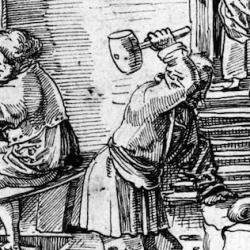David Crystal has plundered the Oxford Thesaurus to come up with a compilation of oddities and forgotten words in Words in Time and Place.
Crystal chose words based on several criteria: They choice of fields had to reflect the thesaurus as a whole; he wanted to reflect the global character of English; and he searched for words that represented the “types of word-class (parts of speech) and word-formation found in English.”
His discussion of the “language of death” includes some gems, like “starve”: “Today, of course, it typically means ‘be very hungry’; but OE the notion of ‘starving to death’ captures the original use of starve, which meant simply ‘die’. Chaucer in Troilus and Criseyde (c.1374) has Christ ‘first starf, and ros’ – he died and rose again.”
Then there’s “spill” from the fourteenth century: “Spillan meant ‘to kill’ in Old English (the modern sense of ‘flowing over an edge’ is much later, seventeenth century), and a weaker sense of ‘perish’ was often used in Middle English. In the fourteenth-century Romance of William of Palerne (line 1535), Melior begs the ill William to speak to her quickly ‘or i spille sone’ – ‘or I shall die straightway.’” And “disperish,” used “only in Wycliffe’s early translation of the Bible, as in Judith (6: 3): ‘All Israel with thee shall dispershen’ – ‘perish utterly.’”











